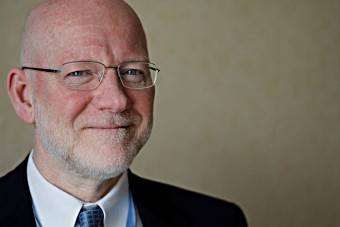Immunisation eyes future with innovation

Dr.Chris Elias, President of the BMGF’s Global Development Program, during the 65th World Health Assembly in Geneva, Switzerland. Source: GAVI/2012.
Geneva, 21 May 2012 - Innovation will play an increasingly important role in reaching the final 20 percent of children who still do not receive routine immunisation, and much of this innovation will be specific to individual countries, a top ranking official from the Bill & Melinda Gates Foundation (BMGF), said on Monday.
Routine immunisation reaches more children than ever before, preventing an estimated two to three million child deaths annually, but every year some 19 million children, roughly 20 percent of all infants, still do not receive basic vaccination against a handful of deadly diseases.
“The last 20 percent of children are much harder to reach than the first 80 percent,” Dr Chris Elias, President of the BMGF’s Global Development Program, said on the margins of this year’s World Health Assembly in Geneva.
Cold chain
“One of the areas where innovation might be most effective in the short term would be innovations in the logistics and cold chain system,” Dr Elias said.
Many countries store vaccines at national regional, district, and even facility- level, for example, but improved information and communication technologies can enhance a system’s efficiency significantly, he said.
“Do you really need regional depots, for example? It is very country specific.” Dr Elias said.
Heat stable vaccines
Heat stable vaccines would be a significant breakthrough, but, as with any new vaccine, they would need lengthy testing and regulation, Dr Elias said.
He noted other innovations such as GPS mapping, solar technology, longer lasting fridge batteries, and diagnostic tools for disease surveillance in low-income countries.
Global Vaccine Action Plan
In his new role for less than four months as president of the Bill & Melinda Gates Foundation’s Global Development Programme, Dr Elias is in Geneva to attend the World Health Assembly, whose agenda this year includes discussion of a new Global Vaccine Action Plan (GVAP) and a resolution to declare completing polio eradication a global public health emergency.
With expert contributions from nearly 300 countries and organisations, the GVAP showcases the huge potential benefits of eradicating polio and ramping up the introduction and coverage of existing and new vaccines over the course of the decade.
“How it actually happens in each country will be informed by the countries’ priorities, by their epidemiology, by their systems,” Dr Elias said. “The GVAP is in some ways just the beginning of that process for expanding coverage at country level.”
“We are committed to working with all partners in the global immunisation space to bring the benefits of these life-saving vaccines to all, no matter where they live.” he said.
